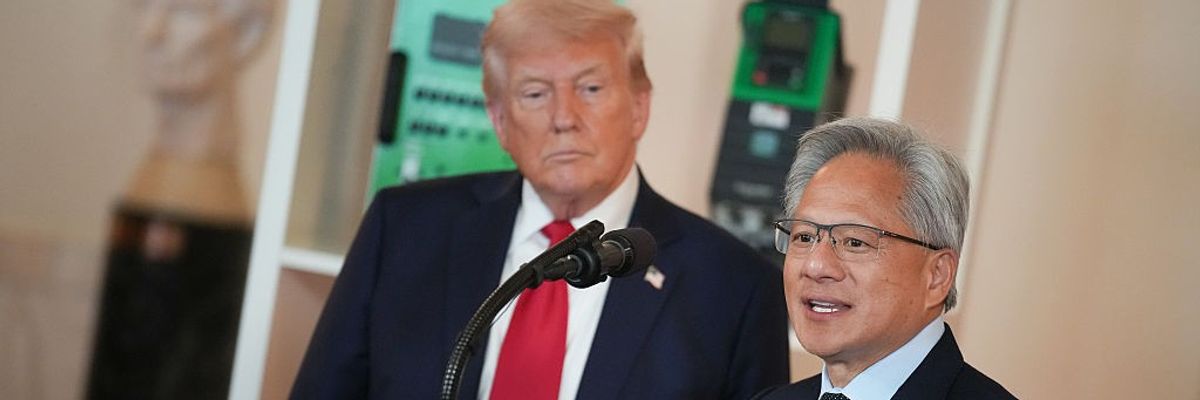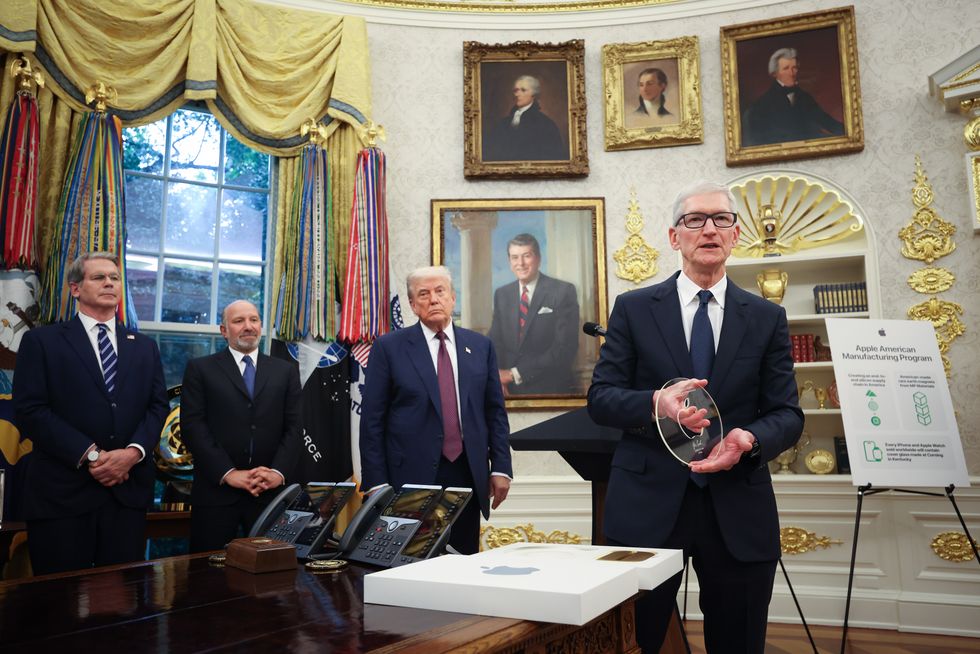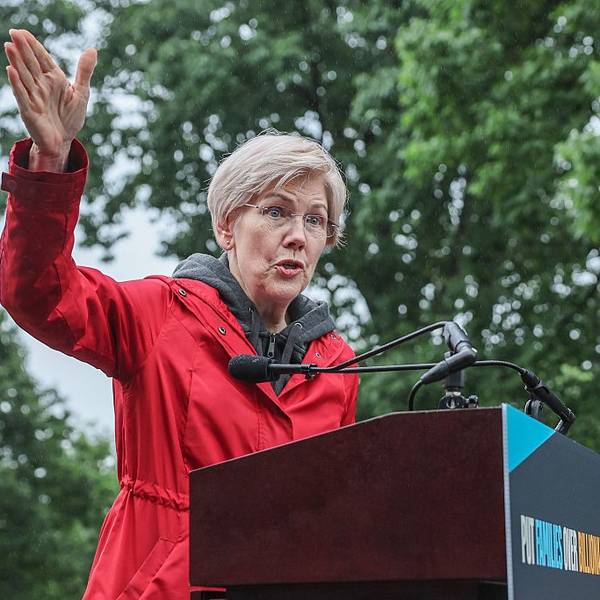
US President Donald Trump listens as Nvidia CEO Jensen Huang speaks in the Cross Hall of the White House on April 30, 2025 in Washington, D.C.
White House Scorecard Rates Companies Based on How Much They Fawn Over Trump's Agenda
"Just one authoritarian thing after another."
US President Donald Trump's White House has reportedly created a scorecard that rates American corporations and trade groups based on how fervently they have promoted Trump's agenda, a move that critics described as part of the president's authoritarian approach to governing and dealing with private businesses.
Axios, which first reported on the White House scorecard Friday, explained that the document "rates 553 companies and trade associations on how hard they worked to support and promote President Trump's 'One Big Beautiful Bill,'" which includes massive corporate tax breaks and unprecedented cuts to safety net programs.
"Factors in the rating include social media posts, press releases, video testimonials, ads, attendance at White House events, and other engagement related to 'OB3,' as the megabill is known internally," the outlet reported. "The organizations' support is ranked as strong, moderate, or low. Axios has learned that 'examples of good partners' on the White House list include Uber, DoorDash, United, Delta, AT&T, Cisco, Airlines for America, and the Steel Manufacturers Association."
The spreadsheet is reportedly being circulated to senior White House staffers and is expected to evolve to gauge companies' support for other aspects of the president's agenda. Corporations that decline to praise Trump's policies—or dare to criticize them—could face government retribution.
"Just one authoritarian thing after another," Rachel Barnhart, a Democratic member of the Monroe County, New York Legislature, wrote in response to the Axios story.
News of the internal "loyalty rating" spreadsheet comes days after Trump reached an unprecedented deal with the chip giants Nvidia and Advanced Micro Devices that critics likened to a strongman-style "shakedown." The companies agreed to pay the US government 15% of their revenues from exports to China in exchange for obtaining export licenses.
Trump, who has reported substantial holdings in Nvidia, has hosted company CEO Jensen Huang—one of the richest men in the world—at the White House at least twice this year. Huang has effusively praised the president, calling his policies "visionary."
That's just one example of how major CEOs have sought to flatter Trump, who has proven willing to publicly attack executives—and even demand their resignation.
Fortune noted Wednesday that "Apple CEO Tim Cook gave Trump a customized glass plaque mounted on a 24-karat gold stand last week, when he announced his company’s $100 billion investment in domestic production."
Cook also donated $1 million to Trump's inaugural fund.

Companies that have worked to get in the president's good graces appear to be reaping significant rewards.
A Public Citizen analysis published earlier this week found that companies spending big in support of Trump are among the chief beneficiaries of his administration's deregulatory blitz and retreat from corporate crime enforcement.
"Tech corporations facing ongoing federal investigations and enforcement lawsuits that are at risk of being dropped or weakened following the industry's influence efforts include Amazon, Apple, ByteDance, Google, Meta, OpenAI, Snap, Uber, Zoom, and Musk-helmed corporations The Boring Company, Neuralink, SpaceX, Tesla, X, and xAI," the group said.
Business journalist Bill Saporito wrote in an op-ed for The New York Times earlier this week that "in ripping up numerous business regulations, Donald Trump seems intent on replacing them with himself."
"The recipient corporations don't necessarily want Mr. Trump's meddling, particularly given his fun house view of economics," Saporito added, "but they can't get away from it."
An Urgent Message From Our Co-Founder
Dear Common Dreams reader, The U.S. is on a fast track to authoritarianism like nothing I've ever seen. Meanwhile, corporate news outlets are utterly capitulating to Trump, twisting their coverage to avoid drawing his ire while lining up to stuff cash in his pockets. That's why I believe that Common Dreams is doing the best and most consequential reporting that we've ever done. Our small but mighty team is a progressive reporting powerhouse, covering the news every day that the corporate media never will. Our mission has always been simple: To inform. To inspire. And to ignite change for the common good. Now here's the key piece that I want all our readers to understand: None of this would be possible without your financial support. That's not just some fundraising cliche. It's the absolute and literal truth. We don't accept corporate advertising and never will. We don't have a paywall because we don't think people should be blocked from critical news based on their ability to pay. Everything we do is funded by the donations of readers like you. Will you donate now to help power the nonprofit, independent reporting of Common Dreams? Thank you for being a vital member of our community. Together, we can keep independent journalism alive when it’s needed most. - Craig Brown, Co-founder |
US President Donald Trump's White House has reportedly created a scorecard that rates American corporations and trade groups based on how fervently they have promoted Trump's agenda, a move that critics described as part of the president's authoritarian approach to governing and dealing with private businesses.
Axios, which first reported on the White House scorecard Friday, explained that the document "rates 553 companies and trade associations on how hard they worked to support and promote President Trump's 'One Big Beautiful Bill,'" which includes massive corporate tax breaks and unprecedented cuts to safety net programs.
"Factors in the rating include social media posts, press releases, video testimonials, ads, attendance at White House events, and other engagement related to 'OB3,' as the megabill is known internally," the outlet reported. "The organizations' support is ranked as strong, moderate, or low. Axios has learned that 'examples of good partners' on the White House list include Uber, DoorDash, United, Delta, AT&T, Cisco, Airlines for America, and the Steel Manufacturers Association."
The spreadsheet is reportedly being circulated to senior White House staffers and is expected to evolve to gauge companies' support for other aspects of the president's agenda. Corporations that decline to praise Trump's policies—or dare to criticize them—could face government retribution.
"Just one authoritarian thing after another," Rachel Barnhart, a Democratic member of the Monroe County, New York Legislature, wrote in response to the Axios story.
News of the internal "loyalty rating" spreadsheet comes days after Trump reached an unprecedented deal with the chip giants Nvidia and Advanced Micro Devices that critics likened to a strongman-style "shakedown." The companies agreed to pay the US government 15% of their revenues from exports to China in exchange for obtaining export licenses.
Trump, who has reported substantial holdings in Nvidia, has hosted company CEO Jensen Huang—one of the richest men in the world—at the White House at least twice this year. Huang has effusively praised the president, calling his policies "visionary."
That's just one example of how major CEOs have sought to flatter Trump, who has proven willing to publicly attack executives—and even demand their resignation.
Fortune noted Wednesday that "Apple CEO Tim Cook gave Trump a customized glass plaque mounted on a 24-karat gold stand last week, when he announced his company’s $100 billion investment in domestic production."
Cook also donated $1 million to Trump's inaugural fund.

Companies that have worked to get in the president's good graces appear to be reaping significant rewards.
A Public Citizen analysis published earlier this week found that companies spending big in support of Trump are among the chief beneficiaries of his administration's deregulatory blitz and retreat from corporate crime enforcement.
"Tech corporations facing ongoing federal investigations and enforcement lawsuits that are at risk of being dropped or weakened following the industry's influence efforts include Amazon, Apple, ByteDance, Google, Meta, OpenAI, Snap, Uber, Zoom, and Musk-helmed corporations The Boring Company, Neuralink, SpaceX, Tesla, X, and xAI," the group said.
Business journalist Bill Saporito wrote in an op-ed for The New York Times earlier this week that "in ripping up numerous business regulations, Donald Trump seems intent on replacing them with himself."
"The recipient corporations don't necessarily want Mr. Trump's meddling, particularly given his fun house view of economics," Saporito added, "but they can't get away from it."
US President Donald Trump's White House has reportedly created a scorecard that rates American corporations and trade groups based on how fervently they have promoted Trump's agenda, a move that critics described as part of the president's authoritarian approach to governing and dealing with private businesses.
Axios, which first reported on the White House scorecard Friday, explained that the document "rates 553 companies and trade associations on how hard they worked to support and promote President Trump's 'One Big Beautiful Bill,'" which includes massive corporate tax breaks and unprecedented cuts to safety net programs.
"Factors in the rating include social media posts, press releases, video testimonials, ads, attendance at White House events, and other engagement related to 'OB3,' as the megabill is known internally," the outlet reported. "The organizations' support is ranked as strong, moderate, or low. Axios has learned that 'examples of good partners' on the White House list include Uber, DoorDash, United, Delta, AT&T, Cisco, Airlines for America, and the Steel Manufacturers Association."
The spreadsheet is reportedly being circulated to senior White House staffers and is expected to evolve to gauge companies' support for other aspects of the president's agenda. Corporations that decline to praise Trump's policies—or dare to criticize them—could face government retribution.
"Just one authoritarian thing after another," Rachel Barnhart, a Democratic member of the Monroe County, New York Legislature, wrote in response to the Axios story.
News of the internal "loyalty rating" spreadsheet comes days after Trump reached an unprecedented deal with the chip giants Nvidia and Advanced Micro Devices that critics likened to a strongman-style "shakedown." The companies agreed to pay the US government 15% of their revenues from exports to China in exchange for obtaining export licenses.
Trump, who has reported substantial holdings in Nvidia, has hosted company CEO Jensen Huang—one of the richest men in the world—at the White House at least twice this year. Huang has effusively praised the president, calling his policies "visionary."
That's just one example of how major CEOs have sought to flatter Trump, who has proven willing to publicly attack executives—and even demand their resignation.
Fortune noted Wednesday that "Apple CEO Tim Cook gave Trump a customized glass plaque mounted on a 24-karat gold stand last week, when he announced his company’s $100 billion investment in domestic production."
Cook also donated $1 million to Trump's inaugural fund.

Companies that have worked to get in the president's good graces appear to be reaping significant rewards.
A Public Citizen analysis published earlier this week found that companies spending big in support of Trump are among the chief beneficiaries of his administration's deregulatory blitz and retreat from corporate crime enforcement.
"Tech corporations facing ongoing federal investigations and enforcement lawsuits that are at risk of being dropped or weakened following the industry's influence efforts include Amazon, Apple, ByteDance, Google, Meta, OpenAI, Snap, Uber, Zoom, and Musk-helmed corporations The Boring Company, Neuralink, SpaceX, Tesla, X, and xAI," the group said.
Business journalist Bill Saporito wrote in an op-ed for The New York Times earlier this week that "in ripping up numerous business regulations, Donald Trump seems intent on replacing them with himself."
"The recipient corporations don't necessarily want Mr. Trump's meddling, particularly given his fun house view of economics," Saporito added, "but they can't get away from it."

